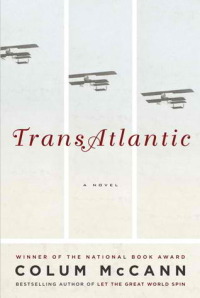TransAtlantic by Colum McCann
 Friday, July 26, 2013 at 10:46AM
Friday, July 26, 2013 at 10:46AM 
Published by Random House on June 4, 2013
Connections across the Atlantic and across time furnish TransAtlantic's theme. The first part of the novel reaches into history to tell three true stories. In 1919, Jack Alcock and Teddy Brown retrofit an airplane once used to make war and use it to make history: the first nonstop transatlantic flight, from Newfoundland to Ireland. In 1845, Frederick Douglass travels from Boston to Dublin to seek Irish support in the fight against slavery. In 1998, Senator George Mitchell flies across the Atlantic to negotiate peace in Northern Ireland. Colum McCann is a loving biographer of these transatlantic voyagers, focusing more intently on their positive qualities than on the faults they may have had. Still, as much as I admired McCann's attempt to personalize the historic, the stories in part one failed to touch my emotional core.
McCann tells three smaller yet richer stories in the novel's second part. These are ordinary people, not the subjects of history texts. Lily Duggan, a maid who meets and admires Frederick Douglass in part one, flees the hardship and pain of Ireland and travels to the promise of America, where she marries an ice dealer and lives a common life of love and loss and modest success. Lily's daughter Emily (a journalist who wrote an article about Frederick Douglass' legacy) crosses the Atlantic so that she can interview Teddy Brown for the second time (having met him in part one) for a story about the tenth anniversary of his flight. Years later, Emily's daughter Lottie (who chats with Senator Mitchell in part one) is living in Belfast, as are her daughter and grandson. As is true of many people in that time and place (and in many other times and places), Lottie's story ends tragically.
Among the novel's many connections is a letter that Lottie gives Teddy Brown for transatlantic delivery. The letter brings together Frederick Douglass and every female in Lily's family, having been passed from daughter to daughter. It makes its final appearance in part three, more than ninety years after it crossed the ocean. Lottie's daughter Hannah wonders "what might have happened if the letter had made it to its proper destination in Cork, what random turn of events might have grown out of it, what chance, what accidents, what curiosities." TransAtlantic reminds us that life is often shaped by coincidence and chance, that "our lives are thrown into long migratory orbits" by random occurrences and by the things that might have happened but did not.
At some point McCann describes life as "an accumulation of small shelves of incident." TransAtlantic illustrates life as a collection of connected but ever-changing moments, each giving birth to something new as the old vanishes into memory. The world changes, and yet there are constants: war and violence, men and women striving to achieve. McCann's characters carry the weight of history as they battle "ancient hatreds." As one character explicitly states, our stories outlast us. Old stories are eventually retold with new names. Frederick Douglass brings the point home when he considers how people share the same responses to different forms of oppression and thinks about how people on roads in Dublin and Boston are traveling the same road, how they "meld into each other."
After a slow start, parts two and three bring TransAtlantic to life. McCann's prose, while vivid, did not strike me as forcefully here as it did in Let the Great World Spin, but his reliance on clipped, fragmentary sentences eventually grew on me. Both novels make a point about interconnected lives; both make clear that the world keeps turning, no matter how honorably or disgracefully its inhabitants behave. Each is compelling in its own way. If TransAtlantic did not blow me away as did Let the Great World Spin, it eventually worked its literary magic as the story danced from character to character. I'm a bit disappointed that in format and message it is so much like Let the Great World Spin, but TransAtlantic is a worthy novel in its own right.
RECOMMENDED



